Piriton For Dogs: Are These Safe? (+ Piriton Dosage Chart)

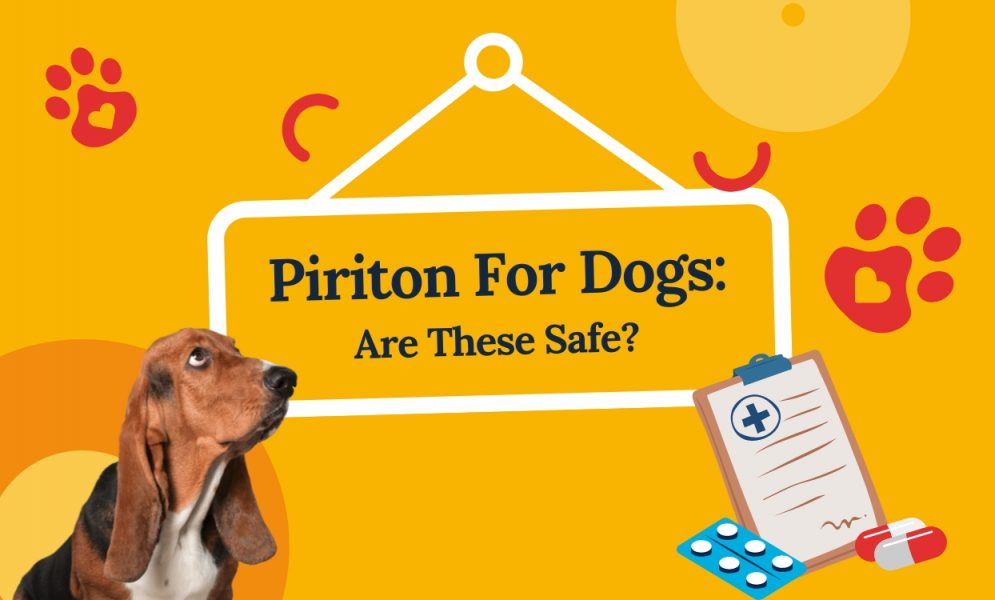
Welcome to The Pets Magazine’s guide to using Piriton for dogs.
So, if you are a worried pet parent who can’t stop thinking about whether Piriton is healthy and safe for your dog, then you have landed on the correct webpage!
In this blog, we will closely look at the different uses of Piriton and its safety for canine health and subsequently address any issues you might have about administering the same. In this context, it is vital to note that before you can give this to your dog, you must get in touch with your vet.
For a broad understanding of Piriton in terms of dealing with canine allergies, scroll down and read our comprehensive blog here. Before we begin, here are the top pros and cons of using Piriton for dogs.
| SL. No. | Pros | Cons |
| 1. | Generally considered to be safe for dogs. | It causes drowsiness. |
| 2. | Easy and convenient to administer. | Dosing needs to be monitored frequently. |
| 3. | It can treat a range of allergies. | Interacts with other medications. |
| 4. | It can be prescribed by vets easily. | It cannot be self-administered without a prescription. |
Piriton For Dogs: What Are These For?
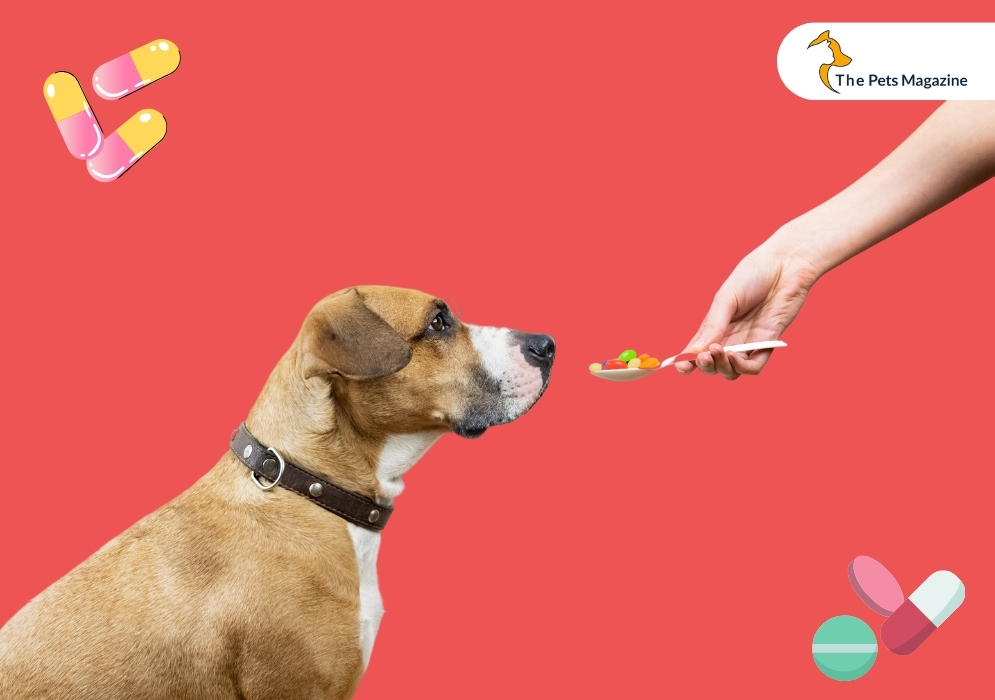
Piriton is a pretty common over-the-counter medicine brand name that contains antihistamine chlorpheniramine. Primarily, it can relieve both dogs and humans from the effects of hives, skin rashes, insect stings, insect bites, hay fever, and allergies.
During any allergic reaction, our bodies (or a dog’s body, in that case) release a chemical called histamine. The antihistamine chlorpheniramine interferes with histamine and its impact, thereby treating allergy symptoms such as itching, sneezing, runny nose, and watery eyes.
However, buying Piriton over the counter for your dog in the form of syrup or a tablet requires a vet’s prescription. While humans primarily use this tablet, you can also use it for your dog. However, due to the sedative effects of the tablet, it can cause heavy drowsiness.
As a result, it is vital to get in touch with your dog’s vet before administering the same to your furry friend.
Histamine And Allergic Reactions: How Piriton Can Treat Your Dog’s Allergy Symptoms?
During the much warmer and hotter Summer months, dogs are more prone to catching allergies. These are basically a type of immune response in your dog’s body – it’s the dog’s way of reacting to foreign particles such as insect venom or pollen.
In most cases, these proteins, also known as allergens, are harmless.
However, if your doggo is allergic or sensitive to any protein specifically (for example, grass pollen), then their immunity system immediately transforms into a proactive and hypersensitive sentinel ready to fight the invading proteins.
Now, it is this particular state of sensitivity and high alert that leads to different allergic reactions, especially even if a tiny amount of allergens ends up entering the dog’s body, with histamine taking the lead in such situations.
So, when your doggo’s body identifies any allergen, it simply goes overdrive, trying to deal with the situation at hand. In the process, your dog’s immunity system launches a complete attack on the foreign protein.
Of course, such an attack causes histamine to be released inside your dog’s body, which in turn sets off a range of responses.
In a majority of cases, histamine’s release triggers local symptoms in your dogs. This means the symptoms are typically confined to only a specific area like their body, nose, or eyes. Moreover, a localized response indicates that your dog’s body is trying to contain a potential threat.
For instance, if a dog is allergic to grass pollen, histamine’s release causes swelling, redness, and itching in your dog’s nose and eyes.
How Piriton Works For Dogs?
To figure out how Piriton can work for dogs, let’s first check out the symptoms that can impact your dog due to environmental factors and allergies:
- Hives,
- Skin rashes,
- Itchy eyes,
- Watery eyes,
- Red eyes,
- Sneezing,
- Blocked nose,
- Runny nose,
- Wheezing,
- Shortness of breath and
- Coughing.
So, the active ingredient in Piriton simply blocks the histamine release in your dog, thereby preventing it from making your dog’s body react to the allergens. This, in turn, offers your dog relief from these pesky allergy symptoms.
Piriton For Dogs: Dosage
To determine the accurate Piriton dosage for your dog, you must consult with your vet. To be honest, there is nobody better than your vet to offer you guidance on medication for your furry friend.
Moreover, it is crucial to ensure your dog’s safety before administering any medicine, especially if your dog is already on medication or suffers from any pre-existing condition.
So, just remember that the dosage will vary depending on your dog’s weight, and consult with your vet about the dosage before giving Piriton to your dog.
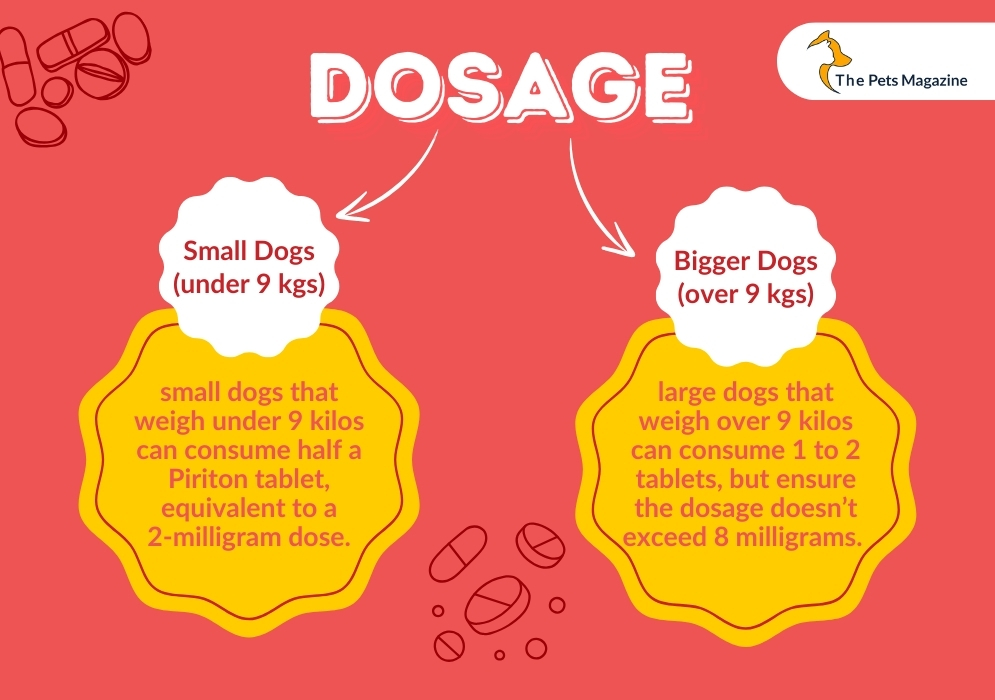
- Small Dogs (under 9 kgs): small dogs that weigh under 9 kilos can consume half a Piriton tablet, equivalent to a 2-milligram dose.
- Bigger Dogs (over 9 kgs): large dogs that weigh over 9 kilos can consume 1 to 2 tablets, but ensure the dosage doesn’t exceed 8 milligrams.
Additionally, it is essential that you get in touch with your vet before giving your dog this medicine for the first time. And even while you are administering this medicine, it is crucial that you follow certain guidelines in order to ensure that your dog stays healthy.
Piriton For Dogs: Can You Give Piriton To Your Dog Everyday?

It is generally safe to give Piriton to your dogs regularly as long as you follow the accurate dosage routine as per your vet’s instructions.
While there are some dogs that might need the medicine only before embarking on any outdoor adventure during Summer and Spring, it is still crucial that you are careful.
Moreover, you will see that allergic reactions in dogs and humans are very similar, resulting from their body’s reaction to airborne pollen. But, administering this medicine consistently to your dogs should be done only under your vet’s guidance and accompanied by a long-term plan.
Piriton Dosage Chart:
Thanks to www.forum.breedia.com (and our in-house experts), check out the detailed Piriton Dosage chart for your dog.
Please Note: While the chart is accurate, it is imperative to consult with your dog’s vet before administering Piriton or any other medication to your dog.
| Medicine | Medication Strength | Dog Weight | Frequency |
| Chlor-Tripolon (Chlorpheniramine) | 4 mg tablet | 1 – 5 kgs: ¼ – ½ tablet | 5 – 10 kgs: 1 tablet | 10 – 15 kgs: 1 to 2 tablets | 15 – 25 kgs: 2.5 tablets | > 25 kgs: 3 tablets. | 2 – 3 times/ day |
| Benadryl (Diphenhydramine) | 1.25ml/mg liquid | 25 mg capsule | 1 – 5 kgs: 1 tsp | 5 – 10 kgs: 1 capsule | 10 – 15 kgs: 1 capsule | 15 – 25 kgs: 2 capsules | > 25 kgs: 2 capsules. | 3 times/ day |
| Allegra (Fexofenadine HCL) | 60 mg tablet | 1 – 5 kgs: NA | 5 – 10 kgs: ½ tablet | 10 – 15 kgs: ½ to 1 tablet | 15 – 25 kgs: 1 to 2 tablets | > 25 kgs: 2 tablets. | 1 time/ day |
| Claritin (Loratadine) | 1 ml/mg liquid | 10 mg tablet | 1 – 5 kgs: ¼ – ½ tsp | 5 – 10 kgs: ½ – 1 tsp | 10 – 15 kgs: ½ to 2 tablets | 15 – 25 kgs: 1 tablet | > 25 kgs: 1.5 tablets. | 1 time/ day |
| Reactine (Cetirizine HCL) | 1 ml/mg liquid | 5 mg tablet | 1 – 5 kgs: ¼ – ½ tsp | 5 – 10 kgs: 1 tablet | 10 – 15 kgs: 2 tablets | 15 – 25 kgs: 3 tablets | > 25 kgs: 4 tablets. | 1 time/ day |
Is It Necessary To Give Piriton To Your Dog?
It is crucial to identify whether or not your dog needs Piriton. So, if you witness your dog experiencing skin irritation, watery eyes, sneezing, itching, or other similar symptoms, then it could mean that your dog has some allergies.
Moreover, if you see that these allergies are causing your dog significant discomfort and impacting their overall quality of life, then it is best to consult with your vet and use Piriton for your dog.
Piriton For Dogs: Are These Safe?
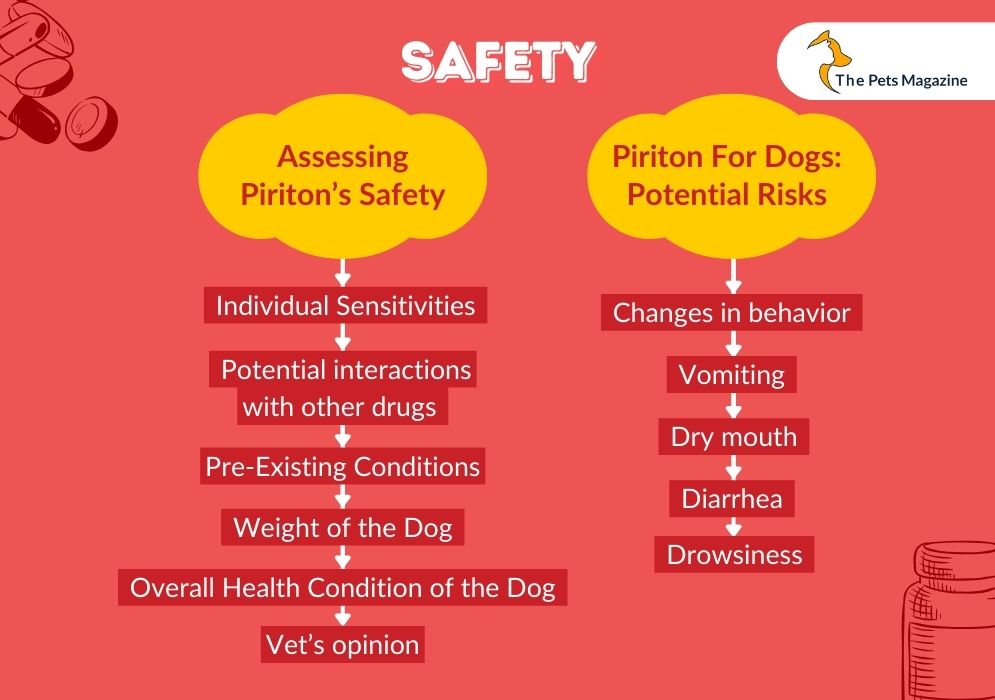
So, is Piriton safe for dogs?
Ideally, yes. Of course, you will need a prescription from your veterinarian before you can administer the same to your doggo. However, the medicine is generally safe when you ensure that the dosage and frequency are accurate.
Having said that, you should also know that the drug’s active ingredient (chlorpheniramine) poses potential risks when it comes in contact with any other drug that your dog might be consuming.
Additionally, there’s more than one drug that can engage with the medicine’s active ingredient. As a result, it is vital to get in touch with your vet before you give this tablet to your dog, especially if they are already taking some other medication. This also holds true for dogs with pre-existing health problems.
Just remember that you have to establish a correct dosage routine to ensure that they are healthy and safe.
Assessing Piriton’s Safety:
In order to assess the safety of Piriton for dogs, you have to consider the following factors:
- Individual sensitivities.
- Potential interactions with other drugs.
- Pre-existing conditions.
- Weight of the dog.
- Overall health condition of the dog.
- Vet’s opinion.
If you consider these factors and work closely with your vet, then you can easily ensure Piriton’s safety when treating your dog’s allergies. So, remember that your vet happens to be your best source for one-on-one guidance and advice based on the specific needs and medical history of your dog.
Piriton For Dogs: Potential Risks
Before you can choose Piriton for dogs, let’s check out the potential risks associated with the same. To cut a long story short, here are the top side effects of Piriton:
- Changes in behavior,
- Vomiting,
- Dry mouth,
- Diarrhea, and
- Drowsiness.
| Please Note: It is vital that you opt for the correct dosage while administering this medicine to your dog – it is vital for your dog’s health and safety. Moreover, drowsiness is common, similar to how humans experience the same. But it is typically not a reason for concern unless it gets excessive. Moreover, if your dog undergoes persistent diarrhea after consuming Piriton, then you must seek your vet’s advice. Just make sure that your dog is drinking enough water to treat dry mouth. Additionally, if your dog vomits after consuming Piriton, then you need to determine whether your pet is spitting the medicine out. Also, if the vomiting continues, you should immediately consult with your vet. |
Alternatives To Piriton For Dogs: Natural Remedies
While choosing Piriton for dogs might be a safe option, many pet parents seek more natural remedies.
So, if your dog has flaky and itchy skin and you are seeking a relatively natural solution, then the best place to begin would be your doggo’s diet. For most dogs, a high-quality diet can work wonders, treating itchiness and allergies easily.
In fact, reputable dog food supply brands like Different Dog, Butternut Box, and Tuggs offer high-quality food specifically tailored to your dog’s needs. Moreover, such food can also help to relieve your dog from itchiness and other pesky allergies.
Another natural remedy that can help in this case happens to be salmon oil. Interestingly, this oil can help with several allergies, including dust, plant, food, and flea allergies.
Piriton Vs. Other Antihistamines: Which Medication Should You Choose?
Piriton is not the only antihistamine that is commonly used to treat allergies in dogs.
So, when it comes to selecting the correct medicine for your dog, it is vital to consider the differences and similarities between our medicine of the hour, i.e., Piriton, and the other alternatives.
In this context, the first factor to take into account is the active ingredient present in each antihistamine is different. So, Piriton comprises chlorphenamine maleate – which helps to relieve dogs from sneezing, itching, and similar allergy symptoms.
However, there are other antihistamines that contain different active ingredients, such as loratadine or cetirizine.
Another factor that you must consider is both the dosage as well as the administration. Moreover, you will find Piriton mostly in tablet form, with the dosage typically depending on the weight of the dog.
In contrast, other antihistamines are available in other forms, like liquid formulations or chewable tablets. Naturally, these are relatively more chewable, making them more convenient for many dog parents.
Also, it is worth noting that Piriton is great for treating allergy symptoms in dogs. You will see that other antihistamines are better suited for certain specific conditions like skin or nasal allergies. So, it is better to consult with your vet and find out the right medication for the specific needs of your dog.








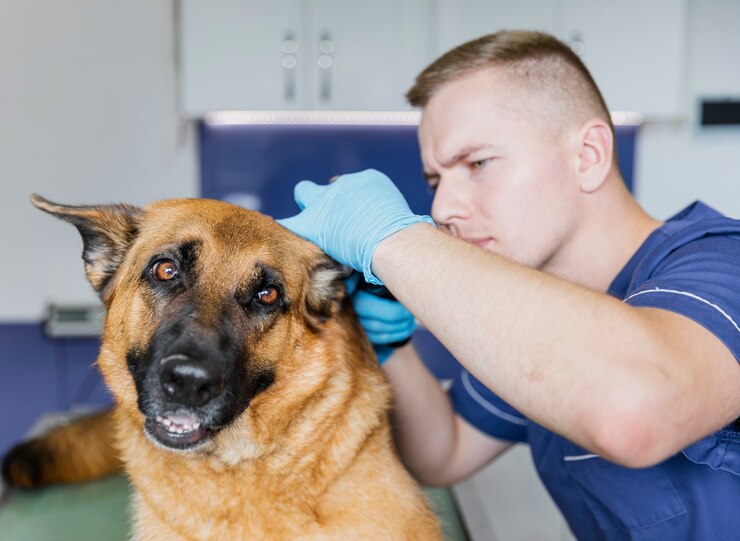
Leave A Comment